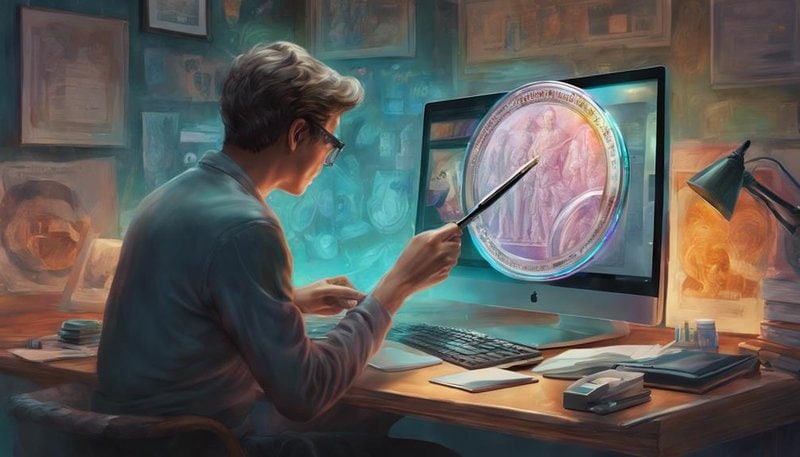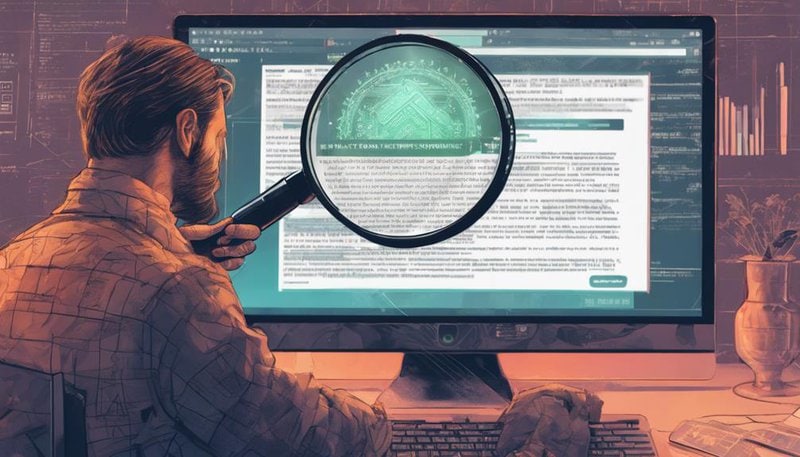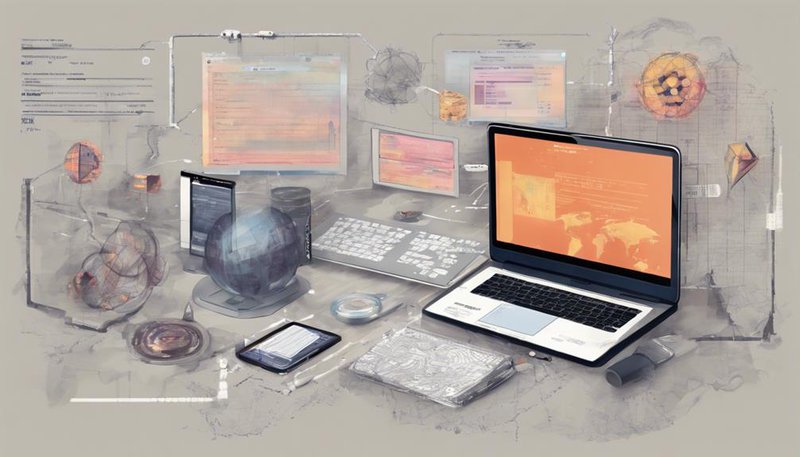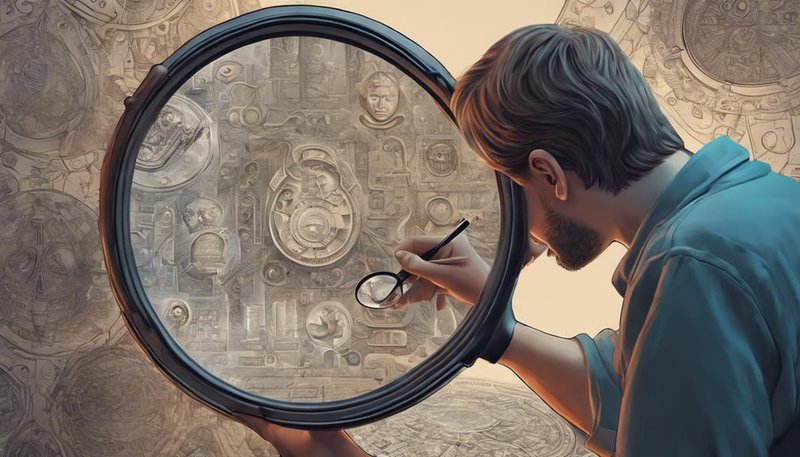How to Verify NFT Authenticity: Ensuring Genuine Ownership

To verify the authenticity of an NFT, it is crucial to understand the underlying blockchain technology and the metadata associated with the digital asset. This information is key to establishing genuine ownership and ensuring the uniqueness of the NFT. By examining the blockchain records and verifying the metadata linked to the NFT, one can confirm its authenticity and provenance. It is essential to conduct thorough research and due diligence to validate the legitimacy of an NFT before making any transactions or investments.
Understanding the blockchain technology that powers NFTs is essential as it provides a decentralized and transparent ledger of ownership. Each NFT is uniquely identified and recorded on the blockchain, making it tamper-proof and immutable. By verifying the transaction history and ownership details on the blockchain, one can authenticate the provenance of an NFT and confirm its originality. Additionally, examining the metadata embedded within an NFT, such as details about the creator, creation date, and any associated royalties or licenses, can further validate its authenticity.
In conclusion, verifying the authenticity of an NFT involves understanding the blockchain technology and metadata associated with the digital asset. By leveraging these tools and conducting proper research, one can ensure genuine ownership and establish the uniqueness of an NFT. It is crucial to exercise caution and diligence when dealing with NFTs to avoid falling victim to fraud or counterfeit digital assets.
Key Takeaways
- Utilize metadata and smart contract inspection for authenticity assurance.
- Verify ownership through token ID history examination.
- Engage with blockchain tools and communities for transparent verification.
- Ensure genuine ownership by tracking NFT journey and staying informed.
Understanding NFT Basics
To truly grasp the essence of NFTs, one must delve into the foundational principles that underpin their uniqueness and value in the digital realm. Understanding NFT value goes beyond the surface; it involves recognizing the significance of ownership verification techniques. NFTs, or non-fungible tokens, derive their value from the blockchain technology that certifies their authenticity and uniqueness.
When you own an NFT, you possess a digital certificate of ownership that's secured by cryptographic principles. This ownership verification technique ensures that each NFT is distinguishable from any other, making it a one-of-a-kind digital asset. The value of an NFT lies in its scarcity, immutability, and transparency, all of which stem from the ownership verification process embedded in blockchain technology.
Examining Metadata Details
When examining metadata details of an NFT, delve into the intricate digital fingerprints that define its uniqueness and provenance. Metadata analysis is a crucial aspect of the verification process, offering insights into the origin and history of the digital asset. By thoroughly scrutinizing the metadata, you can ensure the authenticity of the NFT and verify its provenance with confidence.
To assist you in this process, consider the following:
- Metadata Verification: Pay close attention to all metadata fields to spot any irregularities or inconsistencies that may indicate potential issues with the NFT's authenticity.
- Provenance Examination: Dive deep into the metadata to trace the NFT's journey from creation to its current state, verifying its authenticity and confirming its chain of ownership.
- Authenticity Assurance: By meticulously analyzing the metadata details, you can establish trust in the NFT's authenticity, providing you with peace of mind regarding its legitimacy in the digital marketplace.
Checking Smart Contract Information

Inspecting the smart contract information of an NFT is essential for verifying its authenticity and ensuring a secure transaction. Smart contract verification plays a crucial role in confirming the legitimacy of the NFT and validating ownership. By delving into the smart contract details, you can gain insights into the specific terms and conditions programmed within the contract. This examination allows you to verify important information such as the creator of the NFT, the total supply, any royalties or fees associated with the NFT, and the permissions granted to the owner.
Ownership validation is a critical aspect of the NFT ecosystem, and smart contract information serves as the foundation for this verification process. Understanding the smart contract helps you confirm that the NFT is indeed a unique digital asset with a secure and transparent ownership structure. By thoroughly checking the smart contract information, you can ensure that the NFT you're considering is authentic and aligns with your expectations of ownership and value.
Exploring Token ID History
By diving into the token ID history, you unearth a treasure trove of insights into the journey and provenance of an NFT. Understanding the token history analysis and provenance tracking can provide you with valuable information about the authenticity and uniqueness of the NFT you're interested in.
Here are some key points to consider:
- Ownership Chain Investigation: Delving into the ownership chain of an NFT allows you to trace back its previous owners, unveiling a narrative of its ownership journey. This can bring a sense of connection to the piece and reveal any potential red flags in its history.
- Transaction Tracing: Examining the transaction history associated with a token ID can shed light on the legitimacy of its ownership transfer. It helps in verifying the authenticity of the NFT and ensuring that it hasn't been involved in any suspicious activities.
- Historical Insights: Exploring the token ID history provides historical context and background information that adds depth and value to the NFT. It allows you to appreciate the story behind the digital asset and understand its significance in the broader NFT ecosystem.
Utilizing Blockchain Explorer Tools

Harnessing the power of blockchain explorer tools elevates your ability to delve into the intricate details of NFT transactions and ownership histories. By utilizing these tools, you gain access to the blockchain transaction records, creating a transparent audit trail that verifies the authenticity of the NFT and provides concrete ownership proof. Through blockchain explorers, you can track the entire journey of an NFT, from its creation to each subsequent transfer of ownership. This level of transparency not only ensures the legitimacy of the NFT but also safeguards against potential fraud or unauthorized duplication.
Blockchain explorer tools offer a comprehensive view of the NFT's metadata, smart contracts, and associated transaction hashes, allowing you to validate its authenticity with confidence. By examining the ownership history and verifying the legitimacy of each transfer, you can establish a secure and reliable chain of ownership. Embracing these tools empowers you to make informed decisions when buying, selling, or trading NFTs, ensuring that you engage in transactions with full transparency and trust.
Verifying Artist and Creator Information
When verifying NFT authenticity, scrutinizing the artist's identity and verifying the creator's work are crucial steps.
Ensuring the artist's identity matches the claimed creator of the NFT adds a layer of trust and credibility to the digital asset.
Verifying the authenticity of the creator's work ensures that you're investing in a legitimate and original piece of art.
Artist's Identity Validation
Ensuring the authenticity of an NFT involves verifying the artist and creator information to establish a secure and transparent connection between the digital asset and its originator. When validating an artist's identity in the NFT space, consider the following:
- Artist Verification: Look for verifiable information about the artist's background and previous works to confirm their identity and credibility.
- Identity Validation: Utilize platforms that offer artist verification services or seek out official statements from the artist to confirm their involvement in creating the NFT.
- Community Engagement: Engage with the NFT community to gather insights and opinions on the artist, helping to validate their identity and ensure trustworthiness in the transaction.
Creator's Work Verification
To validate the authenticity of an NFT, it's crucial to verify the artist and creator information, establishing a clear link between the digital asset and its originator. Ensuring that the creator's identity is genuine involves more than just a name; it requires a deep dive into the artist's background, previous works, and online presence.
Look for signature authentication methods such as digital signatures or embedded codes that uniquely tie the NFT to the creator. Additionally, seek proof of origin by exploring the artist's portfolio, social media accounts, and any official websites that can confirm their involvement in the creation of the NFT.
Engaging With NFT Marketplaces

Navigating the diverse landscape of NFT marketplaces demands a discerning eye and a strategic approach. When engaging with these platforms, it's crucial to stay informed about current market trends and the value of digital assets to make informed decisions.
Here are three key points to consider:
- Research Thoroughly: Take the time to explore different NFT marketplaces and understand their fee structures, user base, and reputation. This knowledge will empower you to choose the platform that aligns best with your goals.
- Connect with the Community: Engaging with other NFT enthusiasts can provide valuable insights and support. Join forums, attend virtual events, and participate in discussions to broaden your understanding of the market.
- Stay Updated: The world of NFTs is constantly evolving. Stay informed about new releases, collaborations, and emerging artists to make the most of your NFT marketplace experience.
Joining NFT Communities and Forums
When you join NFT communities and forums, you step into a world where shared passion and knowledge collide. These spaces offer a wealth of insights, tips, and connections that can enhance your NFT journey.
Community for NFTs
Joining NFT communities and forums can immerse you in a vibrant ecosystem of creators and collectors. Engaging with these communities enhances your knowledge and fosters trust and authenticity within the NFT space. Here are three key benefits of joining NFT communities:
- Shared Passion: Interacting with like-minded individuals who share your enthusiasm for NFTs can be incredibly rewarding. You'll find inspiration, support, and a sense of belonging in these communities.
- Collaborative Learning: By participating in discussions and sharing experiences, you can deepen your understanding of NFTs and stay updated on the latest trends and technologies.
- Networking Opportunities: Building connections within NFT communities can open doors to collaborations, partnerships, and even potential mentorships, enriching your journey in the NFT world.
Forum Benefits
Immersing yourself in NFT communities and forums can amplify your understanding of the NFT space and provide invaluable networking opportunities. Engaging actively in these platforms fosters community engagement and trust-building, creating a supportive environment for both newcomers and seasoned collectors.
By participating in discussions, sharing insights, and seeking advice, you not only expand your knowledge but also establish connections with like-minded individuals who share your passion for NFTs. These forums offer a space for peer validation and expert opinions, allowing you to refine your judgment and make informed decisions regarding NFT purchases and authenticity verification.
Embrace the wealth of knowledge and camaraderie these communities offer, as they can be instrumental in your NFT journey.
Seeking Verification From Authenticators

In the quest for verifying the authenticity of an NFT, turning to trusted authenticators for validation is a crucial step towards ensuring its legitimacy. When seeking verification from authenticators, consider the following:
- Expert Validation: Relying on experts in the field of NFT authentication can provide you with the necessary assurance that your digital asset is indeed genuine. Their knowledge and experience can offer valuable insights into the authenticity verification methods, ensuring a thorough assessment.
- Professional Assessment: Authenticators equipped with professional tools and methodologies can delve deep into the origins and history of an NFT, offering a comprehensive evaluation that goes beyond surface-level checks. This professional assessment adds an extra layer of trustworthiness to the verification process.
- Peace of Mind: By seeking verification from authenticators, you can rest assured that you have taken all the necessary steps to validate the authenticity of your NFT. This peace of mind is priceless in the ever-evolving landscape of digital assets, providing you with confidence in your ownership.
Ensuring Secure Storage and Transfer
To safeguard the integrity of your NFT, prioritize implementing robust measures for secure storage and transfer. Ensuring secure transactions and ownership protection is paramount in the world of NFTs.
Begin by choosing a reputable digital wallet with top-notch security features to store your NFTs. Opt for wallets that offer encryption, multi-factor authentication, and cold storage options to keep your assets safe from cyber threats.
When transferring your NFT, double-check the recipient's address to prevent any accidental loss. Consider using platforms that provide escrow services for added security during transactions.
It's vital to stay vigilant and avoid sharing sensitive information that could compromise the safety of your NFT. By taking proactive steps to secure the storage and transfer of your NFT, you can protect your investment and enjoy peace of mind knowing that your digital assets are in safe hands.
Frequently Asked Questions
How Can I Protect My NFT From Being Counterfeited or Replicated?
To safeguard your NFT from counterfeiting or replication, implement robust security measures. Utilize blockchain technology, encryption, and digital signatures. Stay vigilant against potential threats. Protecting your digital assets is crucial in maintaining genuine ownership.
Are There Any Legal Implications or Regulations to Consider When Buying or Selling Nfts?
When buying or selling NFTs, regulatory compliance and legal ramifications are crucial considerations. Ensure you adhere to relevant laws and policies to protect yourself and others involved in the transaction, fostering trust and legitimacy.
Can NFT Ownership Rights Be Transferred or Shared With Others?
When it comes to NFT ownership, there are limitations on sharing rights. To validate ownership, ensure the authenticity of the NFT through blockchain verification. Be cautious and informed to protect your digital assets.
How Do I Ensure the Long-Term Value and Authenticity of My NFT Investment?
To ensure your NFT investment retains long-term value and authenticity, stay informed on market trends, engage in a thorough authentication process, and consider diversifying your portfolio. These strategies can help safeguard your digital assets.
Are There Any Specific Insurance Options Available for NFTs in Case of Loss or Theft?
To protect your NFT investments, explore insurance coverage tailored to their unique value. Consider theft prevention measures like secure storage and using reputable platforms. Safeguard your digital assets with smart choices and proactive planning.









